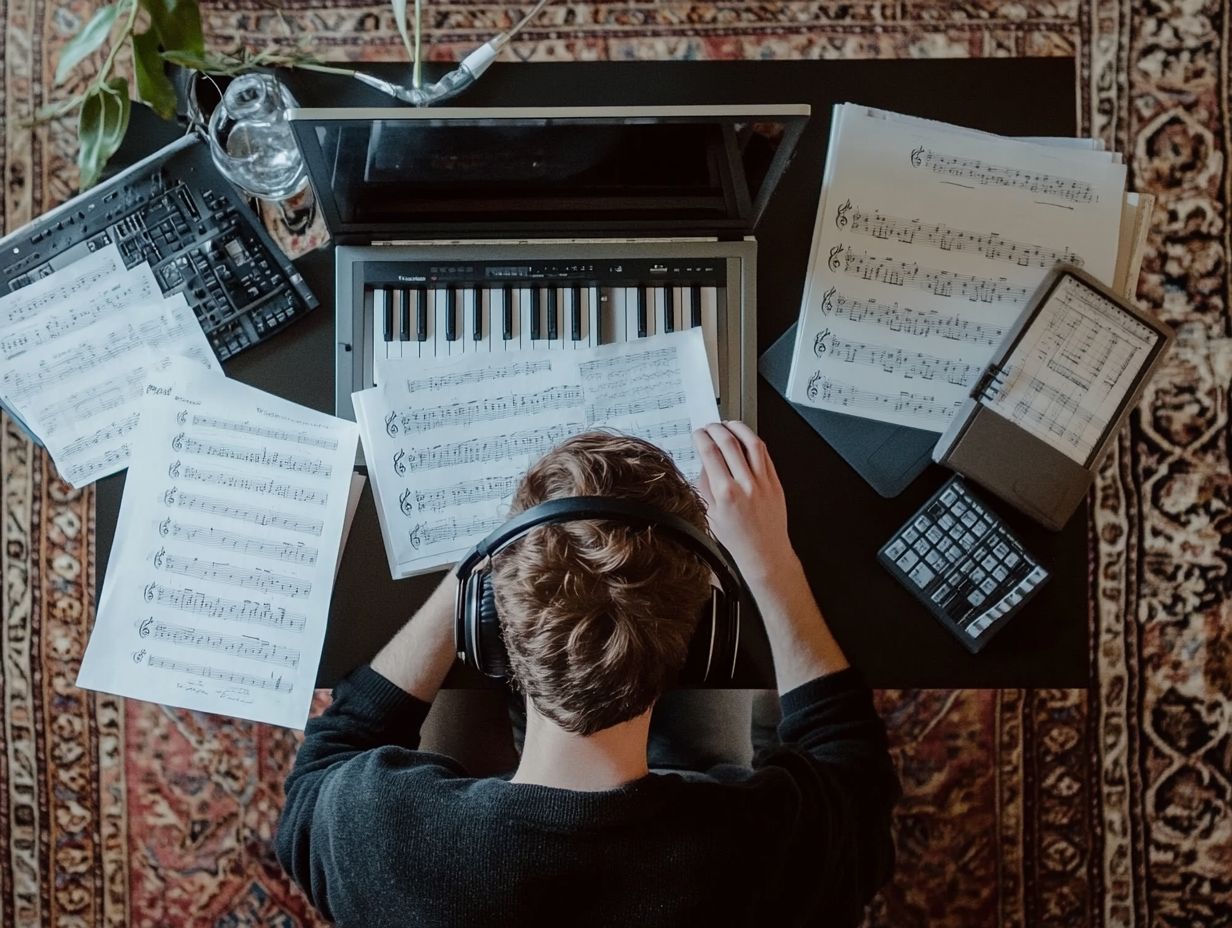preparing for ap music theory exam
If you re preparing for the AP Music Theory Exam, you ve come to the perfect resource.
This comprehensive guide provides you with everything necessary, from a clear understanding of the exam format and scoring to crafting an effective study plan tailored to your needs.
Dive into essential study materials, grasp key concepts such as how different musical notes work together and aural skills, and gather tips to navigate test day with confidence.
Reflecting on your performance afterward is important. Consider continuing your music theory education for growth.
Get ready to ace that exam with confidence!
Contents
- Key Takeaways:
- Overview of the AP Music Theory Exam
- Study Materials and Resources
- Preparing for the Exam
- Key Concepts to Review
- Get Ready to Master the Essentials of AP Music Theory!
- Tips for Test Day
- Post-Exam Reflection and Next Steps
- Frequently Asked Questions
- What is the AP Music Theory Exam?
- How should I start preparing for the AP Music Theory Exam?
- What are some effective study strategies for preparing for the AP Music Theory Exam?
- How can I improve my score on the AP Music Theory Exam?
- What resources are available to help me prepare for the AP Music Theory Exam?
- When should I start preparing for the AP Music Theory Exam?
Key Takeaways:

- Start early and create a study plan to cover all concepts.
- Use recommended textbooks and online resources for in-depth review.
- Practice exercises and take mock exams to assess progress.
- Focus on fundamental music theory concepts, harmonic analysis, and aural skills.
- Use flashcards and mnemonic devices to aid memorization.
- On test day, arrive early and bring necessary materials.
- Use strategies like process of elimination and pacing to answer questions accurately.
- Reflect on performance and continue learning beyond the exam.
Overview of the AP Music Theory Exam
The AP Music Theory Exam is an extensive evaluation crafted by the College Board to assess your understanding and mastery of music theory concepts.
This exam features a range of components, including melodic dictation, harmonic dictation, and score analysis. All these components are designed to test your ability to perform music and showcase your aural skills in a structured environment. It goes beyond mere theoretical knowledge, placing significant emphasis on practical application through free response sections and multiple-choice questions.
For aspiring musicians and composers, this exam is essential.
Format and Scoring
The format of the AP Music Theory Exam is carefully designed to evaluate not just your theoretical knowledge but also your practical skills in music performance and analysis. It features a blend of multiple-choice questions and free-response sections.
The exam is structured into two primary segments: the multiple-choice section, which contains 75 questions aimed at assessing your grasp of musical concepts, and the free-response section, where you ll have the opportunity to compose and analyze musical excerpts.
Scoring is crucial to your success, with the multiple-choice portion contributing 40% to your overall score, while the free-response section accounts for 60%.
A composite score is calculated, and typically, a passing grade begins at a threshold of 3 out of 5, signaling your proficiency in the essential music theory skills that will serve you well in further studies.
Study Materials and Resources
To truly excel in your preparation for the AP Music Theory Exam, it s crucial to embrace a diverse array of study materials and resources that delve into both the fundamental concepts and practical skills of music theory.
Consider incorporating textbooks specifically tailored for AP Music Theory, alongside comprehensive study guides. Additionally, explore various online platforms that provide tutorials and practice tests designed to align with the exam format, ensuring you re well-equipped for success.
Recommended Textbooks and Online Resources
Several recommended textbooks and online resources can significantly enhance your mastery of the concepts needed for the AP Music Theory Exam, spanning from fundamental music theories to advanced harmonic analysis.
For instance, “Tonal Harmony” by Stefan Kostka and Dorothy Payne delves deeply into harmony and voice leading, providing practical exercises that sharpen your understanding of melodic dictation.
The “Music Theory Workbook for Dummies” takes a more approachable route, filled with exercises that reinforce both basic concepts and more intricate techniques like part-writing.
Online platforms such as Teoria and musictheory.net complement these resources beautifully, offering interactive tutorials and quizzes that allow you to practice sight-singing and rhythm exercises at your own pace.
Together, these diverse tools not only clarify complex theories but also encourage daily practice, proving invaluable whether you’re a novice learner or someone looking to refine your skills.
Keep pushing your limits and enjoy the journey of mastering music theory!
Preparing for the Exam
Preparing for the AP Music Theory Exam demands a strategic approach that revolves around crafting a well-structured study plan. You ll want to engage in focused practice through various exercises and take mock exams to assess your understanding and readiness.
By incorporating diverse preparation methods such as reviewing music vocabulary, tackling harmonic dictation, and mastering rhythmic patterns you can ensure a thorough grasp of the subject matter. This multifaceted strategy will equip you for success on exam day.
Creating a Study Plan

Creating a comprehensive study plan for the AP Music Theory Exam is crucial to ensure you cover all the essential concepts from basic music fundamentals to the way chords move in a piece of music so you re fully prepared when exam day arrives.
By laying out a structured approach, you can effectively manage your time. Designate specific blocks for various topics to make sure nothing slips through the cracks.
It s wise to prioritize subjects based on their expected appearance on the exam schedule. This gives you ample time to review the more challenging areas.
Setting clear, attainable goals for each study session will help you stay focused and motivated throughout the preparation process.
Integrating a variety of study resources, like online tutorials, practice quizzes, and engaging discussions with peers, will enhance your learning experience and boost retention of key concepts.
Practice Exercises and Mock Exams
Engaging in practice exercises and mock exams is essential for your AP Music Theory exam preparation. These activities enable you to apply your knowledge and refine your listening skills in a setting that closely resembles the actual test environment.
You ll encounter exercises like melodic dictation, where you transcribe melodies played back to you, and harmonic dictation, which involves identifying chords and the way they move in a piece of music. These focused practices familiarize you with musical notation and enhance your listening acuity.
The format of mock exams closely mirrors the actual test structure. This provides you with invaluable experience in managing time constraints and understanding question types.
Self-assessment is a crucial component of this journey. By pinpointing specific areas that require improvement, you can tailor your study strategies effectively. This ultimately boosts your confidence as you approach the exam.
Key Concepts to Review
Reviewing key concepts will set you on the path to success in the AP Music Theory Exam. This includes a solid grasp of music fundamentals, harmonic analysis, and essential aural skills like sight-singing and melodic dictation.
Mastering these concepts will provide you with a strong foundation, allowing you to delve deeper into the more complex topics of music theory with confidence.
Music Theory Fundamentals
Music fundamentals are the essential building blocks of your AP Music Theory journey. They cover critical topics like musical notation, key signatures, and major scales. Mastering these basics is vital for grasping more complex concepts that await you.
These foundational elements equip you with the necessary tools for notation and music reading. This enhances your ability to analyze and create diverse musical forms.
For example, when you understand key signatures, you can navigate the emotional landscapes of various pieces. Major scales reveal the significance of tension and resolution in compositions.
By looking into these fundamentals, you can actively apply these concepts in your own compositions. This leads to richer performances and a deeper appreciation for the intricate relationships between melodies, harmonies, and rhythms.
Engaging with these elements can elevate your creative process, allowing for greater expression and innovation in your musical endeavors.
Start your study plan today to seize the chance for success!
Get Ready to Master the Essentials of AP Music Theory!
Harmonic Analysis
Harmonic analysis is essential in AP Music Theory. It helps you grasp the role of chords within a harmonic progression and how they shape the overall musical structure.
By breaking down the relationships between chords and pinpointing their specific functions like tonic, which is the home chord, dominant, which leads back to it, and subdominant you can uncover the composer s intentions and the emotional resonance of a piece.
For instance, recognizing a V-I resolution in classical music reveals the tension and release that drives a musical phrase. Similarly, analyzing jazz chords exposes intricate structures and extensions, deepening your improvisational skills.
Mastering these principles not only enhances your appreciation of various genres ranging from rock to pop but also equips you with essential tools for effective composition and performance.
Sight-Singing and Aural Skills
Developing your sight-singing and aural skills is crucial for your AP Music Theory preparation. These abilities enhance your musical memory and empower you to perform melodic dictation with accuracy.
Strengthening these skills serves you well not just during examinations but throughout your musical journey. Techniques like interval recognition, where you learn to identify and sing the distances between pitches, are essential for cultivating a discerning ear.
Practicing rhythmic patterns helps you internalize complex time signatures and significantly improves your overall timing. These skills are vital not only for structured assessments but are also valuable in real-world music situations.
They enable you to collaborate effectively with fellow musicians and interpret compositions with heightened precision.
Tips for Test Day

On test day, employing effective strategies for success can profoundly influence your performance on the AP Music Theory Exam and help you harness your knowledge and skills to their maximum potential.
Strategies for Success
Employing effective strategies can significantly enhance your ability to navigate the test format and manage your time efficiently.
By carefully reading questions and instructions, you can minimize misunderstandings and maximize your performance. It s essential to allocate your time strategically, ensuring that each section receives appropriate attention based on your personal strengths and weaknesses.
For instance, if you excel in melodic dictation but find harmony a bit more challenging, prioritizing your practice and focus during the exam can lead to improved scores.
Engaging in mock exams simulates the real testing environment. This allows you to refine your strategies and boost your confidence. Consistent practice and thoughtful planning can truly make a difference in your outcomes.
What to Bring and What to Expect
Understanding what to bring and what to expect on test day is crucial for your success in the AP Music Theory Exam. This preparation ensures a smooth and focused testing experience.
To set the stage for success, assemble a checklist of necessary items, including sharpened pencils and erasers. Don t forget to pack any allowed supplementary materials, like a ruler or a highlighter, to help you mark key parts of the music score.
On test day, you can expect a well-structured format featuring both multiple-choice questions and free-response sections, all timed to keep you on track. Being aware of the specific duration for each section will help you manage your time effectively, allowing you to complete all questions without unnecessary stress.
Post-Exam Reflection and Next Steps
Post-exam reflection is a vital process for students who have just completed the AP Music Theory Exam. It provides an opportunity to evaluate your performance and thoughtfully consider your next steps in your music theory education.
Reflect on your experience, and let’s keep pushing forward in your music journey!
Evaluating Your Performance
Evaluating your performance on the AP Music Theory Exam is essential for grasping your strengths and weaknesses in music theory concepts and skills.
By carefully reviewing your exam results, you can unearth valuable insights that will support your academic journey. Begin by thoroughly reviewing your answers to spot patterns or common errors, which will help you identify areas that need further attention.
Pay close attention to the feedback from your instructors, as it can reveal specific concepts that might warrant additional focus. Reflecting on your preparation methods is equally important; consider what strategies worked effectively and which ones did not.
This self-assessment gives you the power to craft more effective approaches for future assessments, ultimately deepening your understanding of music theory.
Continuing Music Theory Education
Continuing your music theory education can open exciting doors for you, especially after experiencing the AP Music Theory Exam.
By exploring further studies across various aspects of music, you can unlock opportunities that enhance your theoretical knowledge and refine your skills in composition and performance.
Taking advanced placement courses gives you a structured space to learn, where you can collaborate with peers and seasoned instructors, fostering a vibrant community of aspiring musicians.
Participating in local community programs offers hands-on experiences that enrich your musical journey, helping you apply concepts in real-world scenarios.
This comprehensive approach not only builds your technical proficiency but also nurtures your creativity, preparing you for diverse pathways in your musical career.
Frequently Asked Questions

What is the AP Music Theory Exam?
The AP Music Theory Exam is a standardized test offered by the College Board that assesses students’ understanding of music theory concepts and skills. It is typically taken by high school students enrolled in AP Music Theory courses.
How should I start preparing for the AP Music Theory Exam?
The first step in preparing for the AP Music Theory Exam is to familiarize yourself with the structure and content of the exam. This includes reviewing the test format, specific topics covered, and the scoring guidelines. Gather all necessary study materials, such as textbooks and practice tests.
What are some effective study strategies for preparing for the AP Music Theory Exam?
Effective study strategies for the AP Music Theory Exam include creating a study schedule, practicing regularly with questions and exercises, and seeking help from your teacher or a tutor if needed. It is also important to review and understand key concepts and terms, as well as listen to and analyze various musical pieces.
How can I improve my score on the AP Music Theory Exam?
To improve your score on the AP Music Theory Exam, practice consistently and effectively. This includes using official practice tests, reviewing your mistakes, and seeking additional help if needed. Focus on strengthening your weaker areas and mastering key concepts and skills.
What resources are available to help me prepare for the AP Music Theory Exam?
Many resources are available to help you prepare for the AP Music Theory Exam. These include online study guides, practice tests, review books, and courses. You can also seek help from your teacher, join a study group, or attend review sessions offered by your school or other organizations.
When should I start preparing for the AP Music Theory Exam?
The best time to start preparing for the AP Music Theory Exam is at the beginning of your AP Music Theory course. This will give you enough time to cover all necessary topics and practice regularly before the exam. However, if you are retaking the exam or need to catch up on your studies, it is never too late to start preparing.





